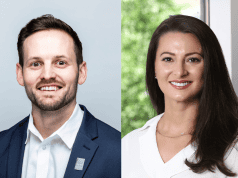When Jack Tullier 23OX 25BBA begins his internship with EY’s Atlanta office of Forensic & Integrity Services this summer, he will be one step closer to his goal of working in the investigative field of forensic accounting.
Tullier, pronounced Tu-lee-ay, is an Auburn, Alabama native, whose love of sports and numbers defined his early years.
“We definitely grew up sports fans,” he says. Tullier notes his parents went to grad school at Auburn University and attending collegiate games was a family staple. “I played baseball. My sister, who is three years older, played softball, and my older brother ran track and played soccer. My upbringing was sports.”
First Steps Toward Forensics
But it was his quantitative side that led him to take an accounting class in high school. This set him on a course that would eventually lead to Emory University.
“My career tech teacher, Miss Fargason, was so inspirational and charismatic” that a career as an accountant looked exciting. She then introduced him to DECA, an organization that prepares emerging leaders and entrepreneurs for college and careers.
“She signed me up for an online forensic accounting competition with DECA. At the time, I knew nothing about forensic accounting. But she told me I would be good at it,” he says, adding, “And I finished first in the state.”
Forensic accountants investigate fraud or financial manipulation through detailed research and analysis. With the DECA win, he began searching for colleges that would ensure his placement at a Big 4 accounting firm. Emory was always high on his list.
I really chose Emory because of the business school faculty. I looked at the research papers and organizations they are involved in.
Jack Tullier
“The second dimension was Emory’s involvement in the Atlanta community, which I think is so special,” Tullier notes.
Diving In
Indeed, Tullier was quick to get involved on campus and in the community during his two years at Oxford College of Emory University.
Through Oxford’s Community and Engaged Learning classes, students take what they learn in class and apply it in the community. They often serve as tutors, mentors, counselors, and advocates for children and adults at community agencies, schools, and child care centers.
“I volunteered once a week at the Washington Street Community Center. It’s an after-school program that focuses on reading and math skills for students in the Oxford, GA area,” he says.
“I was pretty intimidated the first time I had 44 sets of eyes on me, staring me down,” he adds.
It ended up being one of the most rewarding things I’ve done in my life. The impact you can have on these kids is incredible.
Jack Tullier
Tullier would eventually work closely with three students who struggled with standardized tests. It turns out they couldn’t read the directions. “We worked and worked, and they got better,” he says.
He struggles to explain why this experience was so impactful.
“Being from Auburn, you are only exposed to so much. I found myself in an area with a little lower socioeconomic status. Those kids are not coming from the same background as you are,” he explains. “And you get to experience them in their environment. It was so special.”
For instance, he asked why the 4 p.m. snack seemed more like a meal than a snack. “I had formed a relationship with the administrators. So, I could ask questions, and they would be brutally honest with me. So, I asked, ‘Why do they have such big snacks?’ And they said, ‘We don’t know if these kids eat at home.’”
Farming, Finance, and Faculty Mentors
This is just one of many exchanges that widened his perspective on life and work. Tullier also spent five months working on an Enterprise Budget project for Oxford Organic Farm. Not only did he help work the land, but in conjunction with a faculty member and the farm’s director, he helped analyze revenues, costs, and economic profit for the farm’s specialty lettuce product.
“This was all pre-business classes. It was a cool way to get a first-hand understanding of where revenues come from. I learned about what things cost and what makes up economic calculations,” he says.
Tullier would go on to receive the Johnston—Life of Georgia Scholarship. The award is given to one graduating student of Oxford College who is transitioning to Goizueta Business School.
Since his acceptance into the BBA program, Tullier is pursuing a concentration in organization and management and a Master of Professional Accounting degree. He’s immersed himself in school and studies. He still volunteers and serves as a teaching assistant for Tonya Smalls, assistant professor in the practice of accounting, and Jeffrey Byrne, assistant professor in the practice of accounting and director of Master of Professional Accounting.
Another faculty member whose made a significant impact on his college career is Usha Rackliffe, associate professor in the practice of accounting; associate dean and academic director for Master in Management.
She was my tax professor and is my main mentor. She and Jeff Byrne have been my two rocks when it comes to solidifying what I want to do. They have encouraged me to figure out what I am uniquely good at and what are my capabilities.
Jack Tullier
Tullier needed this type of guidance as a focus on forensics normally comes later in a career, after years as a tax accountant or auditor. Indeed, he had to choose between tax and audit in the Goizueta program. He selected the audit path, as it provides a foundation to the investigative and analytical work needed in forensics.
In Goizueta’s undergraduate BBA program, each accounting class builds on another, ensuring retention. This structure, the influence of psychology in the organization and management curriculum, and a desire to prep for his internship prompted Tullier to begin reading up on how firms discover fraud.
The Psychology of Fraud
According to Tullier, many practitioners look to psychology and, increasingly, to research on “The Dark Triad.” This refers to a collection of three personality types—narcissism, Machiavellianism, and psychopathy—that pose a specifically heightened risk to audit procedures and fraud risk assessments. Individuals with one of these traits are more likely, on average, to commit fraud or those who have committed fraud, possess these personality traits, he notes.
Thus, Tullier is researching how implementing a personality assessment aspect into a fraud investigation might make pinpointing persons of interest within an organization easier. Also, he is exploring how well the fraud triangle of opportunity, incentive, then rationalization holds up when someone with one of the Dark Triad personalities morphs into a fraud predator, needing only one leg of the triangle—the opportunity to commit fraud. Reconciling the intricacies of psychology, personality, and fraud will no doubt offer him the type of challenge he craves.
But first, he’ll get a taste of professional accounting as an intern in EY’s Atlanta office of Forensic & Integrity Services, Summer 2024. Normally, interns work in the tax or audit departments In fact, he was offered an internship in the audit department, but took a chance and asked the recruiter if he could meet with the forensics team. The recruiter relented, and the rest, as they say, is history.
“I interviewed and I got it,” he says. “I am super excited.”
It’s been emotional because its full circle. My journey started with that forensic accounting competition, and I feel like I finally made it with getting this forensic offer.
Jack Tullier
When he’s not delving into the psychological profiles of fraudsters, Tullier can be found running at the Lullwater Preserve, playing tennis, volunteering, or visiting the Michael C. Carlos Museum, to satisfy his deep interest in art history and ancient non-Western art.
At Goizueta Business School, we’re in the business of creating powerful leaders. Learn how Goizueta’s undergraduate BBA program can help prepare you to tackle any challenge, anywhere, in any field.











